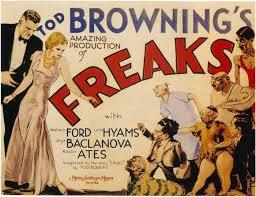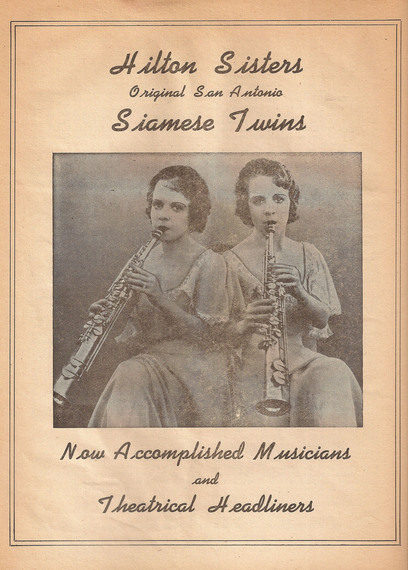American's have long been fascinated by the lives of "freaks." June 27th the award-winning documentary Bound by Flesh opens. 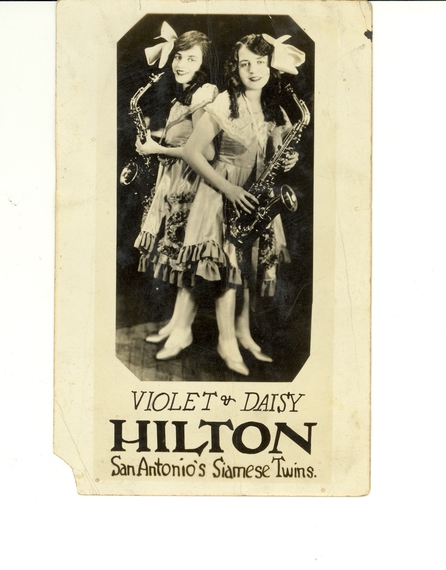
Geek Love author Katherine Dunn wrote: "This brilliant, revelatory biography of the conjoined twins Violet and Daisy Hilton is intelligent, mesmerizing and poignant. The story of the famous Hilton Sisters explores shifting social norms and the evolving history of show business from carnival side shows to vaudeville, burlesque, and beyond. The Hilton Sisters launched out of darkness, reached astounding global stardom, and then plummeted through more darkness to a spare but luminous peace. "Bound By Flesh" is unforgettable."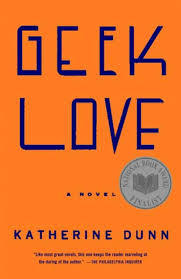
Below is a question and answer session with environmental writer and Huffington Post blogger Jennifer Schwab and the director, Leslie Zemeckis
Jennifer Schwab (Q): This film follows "Behind the Burly Q" which examines the rise and fall
of burlesque in America. Both films cover subjects that are off the beaten path, but are significant historically, especially from the entertainment industry standpoint. Is history of live entertainment in the 20s through 60s your specialty? What is it that attracts you to this type of subject matter?
Leslie Zemeckis (A): Really the 20s through 50s (though I'm slowly moving into the 60s and 70s). I think we are overdue in examining these forms of early American entertainment. I am fascinated by the stories of men, women, and children that worked in burlesque and the circus and vaudeville acts that followed. It is baffling how huge acts like the Hilton sisters have been forgotten today. I like shining a light on these people. They were premier entertainers of today's neo- burlesque, variety shows, cirque du soleil, talk shows and of course - today's freak shows - reality TV.
Jennifer Schwab (Q): This film -- like Behind the Burly Q -- is on some level a story of repression, feminism, independence, with a melancholy ending. We end up liking these female performers but also feeling sorry for them. Please comment on this.
Leslie Zemeckis (A): I don't feel sorry for them. Speaking in general terms they made something of their lives. It is easy to forget women had fewer choices than they do today. And it was even harder if they came from poor backgrounds, weren't educated and so many suffered abuse at the hands of relatives and spouses. But through - burlesque for example - they truly transformed their situations. They became stars in the only way they could. And they lived lives of dignity. It is sad they were often treated disparagingly. Even today we still dismiss so many of these forms of entertainment as being populated with less than talented performers. But they were. They created art. And the "freaks" did to, if they could, if they were taught skills. For many it was better than being shut away in institutions. I try and see the positive in their lives.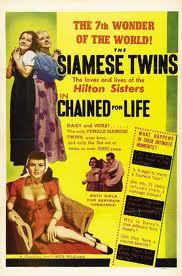
(Q): So do you feel that both the burlesque stars as well as the Hilton Sisters were victims, or at least, were taken advantage of? A common theme seems to be they end up with very little to show for their previous show business success.
(A): The burlesque performers no. They had a lot of control over their acts, what they wore, the music, they were like little producers. They weren't victims of anything, except the public's perception. The public that flocked to their shows and paid them a good living by the way. For the "freaks" it can and was a different story. Speaking only for the Hilton sisters, because they weren't raised with love, because they were so sheltered and kept from school and any sort of normalicy they weren't prepared for the "real world." They weren't taught to be anything but on display - even though they took that and added music and song and dance, that's not a career that will last into their twilight years. They were continually abused and used. But they did love performing. They did love the roar of the crowd. And remember they made - literally - bags of money. They might have seen little of that, but their earning power for "freaks" was tremendous.
(Q): Both films demonstrate a remarkable amount of research. You have on-camera interviews with a wide cast of characters that in many cases were only peripherally involved with the subjects. For example, you found children of the benefactors who helped the Hilton Sisters out in the twilight of their lives in Charlotte, N.C. You found obscure promoters of carnival side shows from the 30s and 40s. How do you track these people down? It must require a huge amount of detective work. Please describe your process.
(A): In the Hilton case I started with author Dean Jensen who wrote a wonderful biography about the "girls" (as I call them), and I branch out and search for names/places/theatres that might have touched their lives. And strangely, because of Behind the Burly Q, people found me once they heard I was doing this film. Fans and collectors of "freaks" and circus memorabilia offered me pictures, names and information. I went to newsreel archives, drove to obscure libraries and dug through books, papers. I have found librarians, anyone who works in a library are our - authors, directors, creators - biggest unsung heros and they want to help. Everyone led me to someone else. I was blown away to find the man who's uncle gifted the twins their cemetery plot. I found him through cold calling. I do the research - 98% of it - myself so I can keep all the names and strings that might lead to something, someone else, in my head.
(Q): Once you locate these people, many of whom are elderly and not accustomed to doing on-camera interviews, how do you persuade them to participate?
(A): Again, for example Camille Rosengren, the twin's goddaughter, her daughter had seen my film and considered me to be "okay". Camille is dignified and would not exploit her relationship with the twins. She doesn't run around giving interviews. But I think my prior work helps. And I don't like to take "no". Not that I hear it too often when I want an interview.
(Q): There are also revealing snippets of actual footage from which must be 60 to almost 85 years old. How do you identify, locate and obtain rights to use this rare footage in your documentaries?
(A): I dug through microfiche and 3 x 5 cards looking for anything. Again, because I do the research myself I knew when I came across a card that said "Jimmy Moore annulment" I had hit gold. There was nothing about Siamese, conjoined, Hilton, anything on the card. But I knew Jimmy Moore had obtained an annulment from Violet. I memorize dates, locations, everything. Information is my friend.
(Q): Do you ever get personally involved in the stories and characters? Do you get to feel like you "know" them? With both the burlesque performers and the Hilton Sisters, did you find yourself kind of rooting for them, championing their cause, or unintentionally trying to put a positive light on their stories? Do you befriend them?
(A): I definitely end up befriending most. How can you not when they invite you into their home, open their scrapbooks and their hearts. It's a big trust. I promise them I will treat them with dignity - but I'm not leaving anything out, no matter how sordid or unattractive. I just want to tell the whole story. And I want to tell it from their point of view. Not mine. That's why I have the actual words of the twins "narrate" their story. As I did with Behind the Burly Q - it's their story, the infighting, the gossip, the fun the tears. I don't put a spin on it. I think the good goes with the bad and ugly. I've kept in touch with so many. Remember I was the first, and often only one who asked them to tell their story. No one cared. The strippers were dismissed as were the "freaks". I saw there was a whole world that needed exploring.
(Q): I realize you are not a physician, but do we still have conjoined twins today, or has medical science evolved to now enable us to separate them at birth? If they still exist, what becomes of them? Are there still Siamese twins at freak shows?
(A): We have some. Some can be separated. A recent pair were separated at birth and just celebrated their 18th birthday. There are no real sideshows today. It's not becoming to see "different" people on display - of course it's okay to do it from the safety of our homes, watching TV. Think of a few reality TV weddings and cat fights.
(Q): You are not formally trained as a writer. How did you start writing and how did you learn to do scripting, treatments, and all the variations required to conceptualize, write, produce and direct a documentary film?
(A): I read read read read. Did I say that enough? When I read a book I study the structure, the words, the sentences. When I watch a film I do the same. I've read enough that I know what a "story" is. And there are certain things I like to do. Start at a point and then go back to the beginning and work forward. I like an inundation of detail, and sidebars and small facts, and gossip that most people get rid of because "it doesn't move the story forward." But those details make a life. And they always answer questions I want answered. I like minutia.
(Q): So what's next up to follow "Bound by Flesh"? I am curious to hear whether your next subject follows in the same vein as it and "Behind the Burly Q"? Most likely some more subject that's been given short shrift.
(A): I've kind of fallen in love with the American Circus. There are more women in particular that need another look at that had fascinating lives and careers. I've just finished (JEN PLS USE THIS) a book about Lili St. Cyr, a very famous stripper in the 1950s, and she'd make a great movie. I've dug up incredible details about her life and people that never spoke about her. She had a life, as they say.
This was a Q & A composed and conducted by environmental writer Jennifer Schwab with filmmaker Leslie Zemeckis for her award-winning documentary "Bound by Flesh" hits select theatres/VOD and iTunes June 27th. www.boundbyflesh.com
Jennifer Schwab
www.huffingtonpost.com/jennifer-schwab

